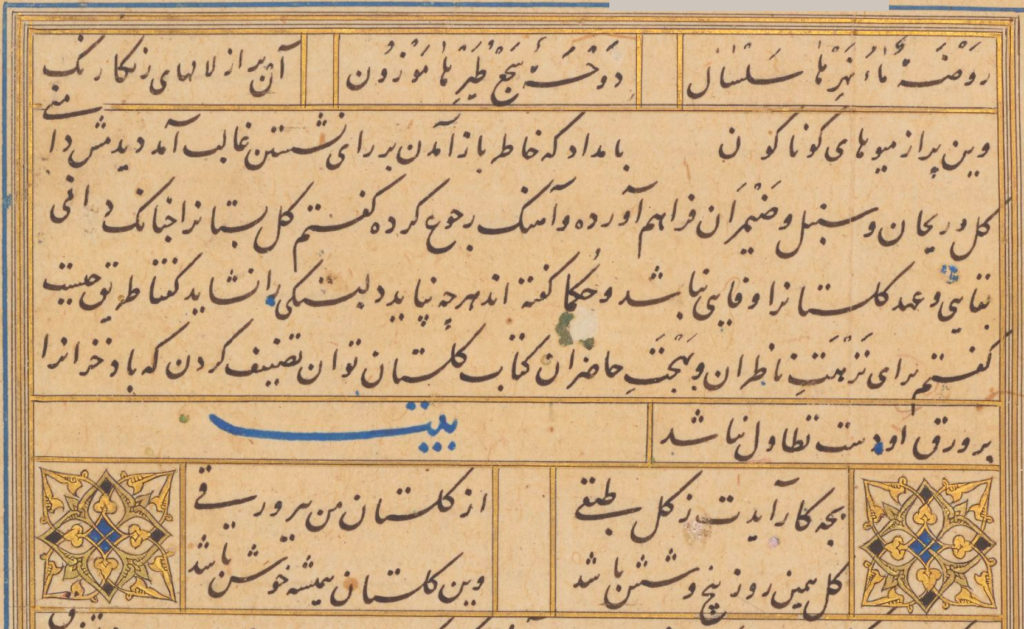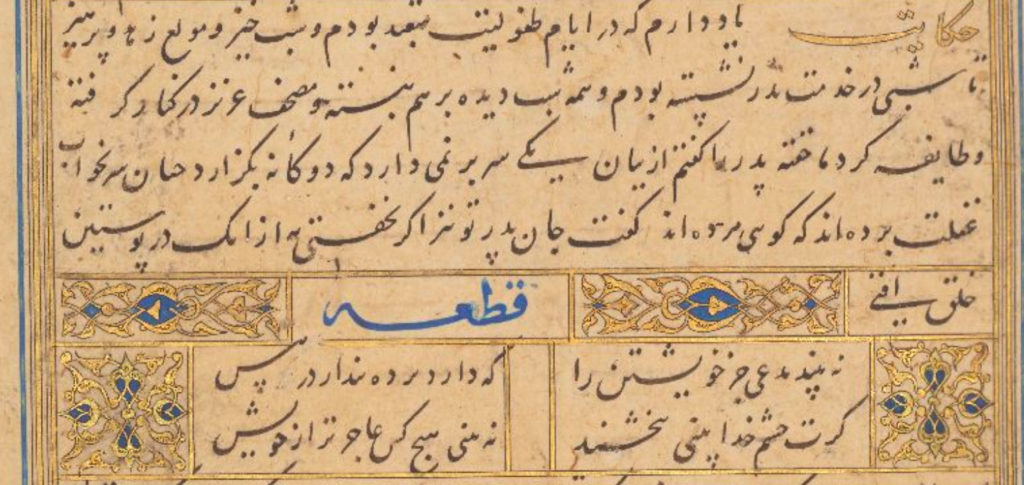وَقَالَ رَبُّكُـمُ ٱدْعُونِيۤ أَسْتَجِبْ لَكُمْ إِنَّ ٱلَّذِينَ يَسْتَكْبِرُونَ عَنْ عِبَادَتِي سَيَدْخُلُونَ جَهَنَّمَ دَاخِرِينَ
40:60. And your Sustainer said: Call unto Me, [and] I shall respond to you! Verily, they who are too proud to worship Me will enter hell, abased!
وَقَالَ رَبُّكُـمُ
وَ
Wāw: ‘Atf connecting this verse to a previous verse(?), order-less there is no particular order between the connected phrases or sentences
قَالَ رَبُّكُـمُ
Your(pl) Rabb (Nurturer, Sustainer, Owner) said: Rabb is the owner nurturer and sustainer of all, including the humans, dead and living. As the owner creator, created our immutable core design (Fitra) upon Divine Oneness and Noesis (Irfan: intimate feel of knowing IT(Hu) from time immemorial (Qidam), unlearnt knowledge/knowing).
كُـمُ
Pronoun “you” plural.
ٱدْعُونِيۤ
Do call(pl) on Me: Sentient beings e.g. humans use their mental and psychological faculties to call to invoke to get attention, in this case the invocation free of any instrumentation or intermediaries, direct and free of any supervision and conditions or stipulations. Direct from deep within the innate intellect to the Creator, an inexorable connection, the foundation of human-ness (Adamiyat).
Irfan (Noesis) 1: Plural pronoun “you” is used to indicate the collective of the humanity, all of us: do call all of you! We call as a community of humans, as we do call on individual basis.
ٱ
Hamza indicator of Imperative form.
و
Connected pronoun plural “you”.
نِيۤ
نِ
The ending Nun (N sound) is called Nun Al-Wiqāya (Protecting N sound) since verbs cannot have Kasra for ending Inflection, Nouns can, verbs cannot. Nun necessary to connect ٱدْعُو (Call) to يۤ (Me) , else Arab would have had difficulty pronouncing.
تفسير تفسير الجيلاني/ الجيلاني (ت713هـ)
{ وَقَالَ رَبُّكُـمُ ٱدْعُونِيۤ أَسْتَجِبْ لَكُمْ إِنَّ ٱلَّذِينَ يَسْتَكْبِرُونَ عَنْ عِبَادَتِي سَيَدْخُلُونَ جَهَنَّمَ دَاخِرِينَ }
{ قَالَ رَبُّكُـمُ } الذي رباكم على فطرة التوحيد والعرفان: { ٱدْعُونِيۤ } أيها المكلفون بمقتضى العقل المفاض حق دعوتي، وتوجهوا إلى مخصلين بلا رؤية الأسباب والوسائل
Irfan (Noesis) 2: In so called subconscious, this linkage is actively established at all times. There is incessant communications back and forth between you and IT(Hu), while your conscious “you” does not see or feel a presence, but you are in two-way communications. No one can take that from you, including your own disbelief! Your Nafs is a capsule encapsulating you so vigorously as though there is nothing else save you, no one else to call upon!
Example: When you felt pleasure, your subconscious issued an invocation of gratitude (from here to there) for ease or acquisition of something desirable beautiful and invocation was accepted and acknowledged (from there to here) and net result of this bi-directional vectorial communication the feel of pleasure!
تفسير البحر المديد في تفسير القرآن المجيد/ ابن عجيبة (ت 1224 هـ)
{ وَقَالَ رَبُّكُـمُ ٱدْعُونِيۤ أَسْتَجِبْ لَكُمْ إِنَّ ٱلَّذِينَ يَسْتَكْبِرُونَ عَنْ عِبَادَتِي سَيَدْخُلُونَ جَهَنَّمَ دَاخِرِينَ }
قال صلى الله عليه وسلم: ” الدعاء هو العبادة ” وقرأ الآية، وفي رواية: ” مخ العبادة ” ، وعن ابن عباس: ” وحَدوني أغفر لكم ” ، فسَّر الدعاء بالعبادة، والعبادة بالتوحيد.
Ibn ‘Ajiba
Du’a is Ibada, said the Prophet peace be upon him.
Further on a tangential interpretation from Ibn Abbas, Ibada is Individuation (Divine Oneness) of Allah.
Consequently Du’a is Individuation (Divine Oneness) of Allah.
Ibn Abbas said: Individuate Me (Allah) and I shall forgive you!
Individuate Me: In English language “one” is a noun for counting one thing or a pronoun. In Arabic “one” could be a verb which has no counterpart to translate and therefore the verb individuate was used to describe application of the verb form of “one” to Allah namely to individuate Allah as the Singleton Nonpareil Being.
Ismail Huqqi
O people! Call on Me! Individuate Me i.e. I shall reward you being linked to or connected to you while being Most Singular!
Dara: Call upon Allah to bring near that Most Singular Presence, not just get some job or worldly relief.
تفسير روح البيان في تفسير القرآن/ اسماعيل حقي (ت 1127 هـ)
{ وَقَالَ رَبُّكُـمُ ٱدْعُونِيۤ أَسْتَجِبْ لَكُمْ إِنَّ ٱلَّذِينَ يَسْتَكْبِرُونَ عَنْ عِبَادَتِي سَيَدْخُلُونَ جَهَنَّمَ دَاخِرِينَ }
{ وقال ربكم } ايها الناس { ادعونى } وحدونى واعبدونى { استجب لكم } اى اثبكم بقرينة
Qushairi
The Du’a has condition and the condition for a proper invocation is lawful provision!
In other words the daily provisions and housing and all that which is required for living is obtained through wholesome means and without transgressing the limits of others.
تفسير لطائف الإشارات / القشيري (ت 465 هـ)
{ وَقَالَ رَبُّكُـمُ ٱدْعُونِيۤ أَسْتَجِبْ لَكُمْ إِنَّ ٱلَّذِينَ يَسْتَكْبِرُونَ عَنْ عِبَادَتِي سَيَدْخُلُونَ جَهَنَّمَ دَاخِرِينَ }
ويقال ادعوني بشرطِ الدعاء، وشرطُ الدعاء الأكلُ من الحلال؛ إذ يقال الدعاء مفتاحُه الحاجة، وأسبابُهُ اللقمةُ الحلال
Tustari
It has been said: Du’a is the most virtuous of all deeds (Hadith?)
It is so since true Du’a is accompanied by begging and seeking refuge and display of poverty and neediness.
تفسير تفسير القرآن/ التستري (ت 283 هـ)
{ وَقَالَ رَبُّكُـمُ ٱدْعُونِيۤ أَسْتَجِبْ لَكُمْ إِنَّ ٱلَّذِينَ يَسْتَكْبِرُونَ عَنْ عِبَادَتِي سَيَدْخُلُونَ جَهَنَّمَ دَاخِرِينَ }
قيل له: ما معنى قولهم: ” الدعاء أفضل العمل “؟ فقال: لأنه تضرع والتجاء وإظهار الفقر والفاقة.
Sullami
Nasr-Abadi said:
Allah made the Du’a a proxy as representative of ITself to people and vice-a-versa the Acceptance again as a proxy. All have to invoke the proxy (as in case of emissary who represents a king as proxy) . And if they do not address the proxy then no acceptance from the king.
Translator’s note: Risky translation requires more expert look at the wording:
لسان العرب
نابَ الشيءُ عن الشيءِ ، يَنُوبُ : قام مَقامه ؛ وأَنَبْتُه أَنا عنه .
تفسير حقائق التفسير/ السلمي (ت 412 هـ)
{ وَقَالَ رَبُّكُـمُ ٱدْعُونِيۤ أَسْتَجِبْ لَكُمْ إِنَّ ٱلَّذِينَ يَسْتَكْبِرُونَ عَنْ عِبَادَتِي سَيَدْخُلُونَ جَهَنَّمَ دَاخِرِينَ }
سمعت النصرآباذى يقول: ناب عن خلقه بالدعاء وناب عنهم بالإجابة فكل يدعو على ما ناب عنه ومن لم ينب عنه فهو المحروم فى الدعاء والممنوع من الإجابة.
Tafsir Ishari by Ahmad Ibn Umar
Call upon Me points at the meaning Do not seek other than Me!
تفسير التأويلات النجمية في التفسير الإشاري الصوفي/ الإمام أحمد بن عمر (ت618 هـ)
{ وَقَالَ رَبُّكُـمُ ٱدْعُونِيۤ أَسْتَجِبْ لَكُمْ إِنَّ ٱلَّذِينَ يَسْتَكْبِرُونَ عَنْ عِبَادَتِي سَيَدْخُلُونَ جَهَنَّمَ دَاخِرِينَ }
ثم أخبر عن استدعاء الدعاء عن أهل الولاء بقوله تعالى: { وَقَالَ رَبُّكُـمُ ٱدْعُونِيۤ أَسْتَجِبْ لَكُمْ } [غافر: 60]، يشير إلى أن معنى ادعوني؛ أي: لا تطلبوا مني غيري فإن من كنت له يكون له ما كان لي، وإن من يطلبني يجدني كما قال ” إلا من طلبني وجدني “
Khitab (Address Mode)
Al-Iltifat (Modal-Switch for Address) renders the shift of attention focus from one mode of addressing to another. In the language of Arab this was an important part of linguistics, very little of it remains today and English language deploys this concept in much diminished ways to be even noticed.
The core of Iltifat is to
- Paint a verbal scenery
- Switch scenes to scenes to dramatize a verbal auditory landscape i.e. to render a concept to be felt by the listener which is larger than the sum of the words
Alfred North Whitehead
Process & Reality
Speculative Philosophy
Chapter I, Section II
“We habitually observe by the ‘method of difference’. Sometimes we see an elephant and sometimes we do not. The result is that an elephant, when present, is noticed. Facility of observation depends on the fact that the object observed is important when present, and sometimes is absent.”
This particular verse is in a collection of several Iltifat and shift of Attention. An auditory landscape is rendered:
See Also:
http://www.untiredwithloving.org/jacob_mirror.html#ka_presence
- We , humanity, all sitting in a large auditorium and these words boom in the loudspeakers:
40:60. And your Sustainer said: Call unto Me, [and] I shall respond to you! Verily, they who are too proud to worship Me will enter hell, abased!
وَقَالَ رَبُّڪُمُ ٱدۡعُونِىٓ أَسۡتَجِبۡ لَكُمۡۚ إِنَّ ٱلَّذِينَ يَسۡتَكۡبِرُونَ عَنۡ عِبَادَتِى سَيَدۡخُلُونَ جَهَنَّمَ دَاخِرِينَ
40:61. Allah Al-Ladhi(That Which) appointed for you night that ye may rest therein, and day for seeing. Lo! Allah is a Lord of bounty for mankind, yet most of mankind give not thanks.
ٱللَّهُ ٱلَّذِى جَعَلَ لَكُمُ ٱلَّيۡلَ لِتَسۡكُنُواْ فِيهِ وَٱلنَّهَارَ مُبۡصِرًاۚ إِنَّ ٱللَّهَ لَذُو فَضۡلٍ عَلَى ٱلنَّاسِ وَلَـٰكِنَّ أَڪۡثَرَ ٱلنَّاسِ لَا يَشۡكُرُونَ
- Announcer on stage points the finger far at Allah the creator of all things:
40:62. Za-Li-Kum (that for you(pl)) (is) Allah, your Lord, the Creator of all things, There is no God save Him. How then are ye perverted?
ذَٲلِڪُمُ ٱللَّهُ رَبُّكُمۡ خَـٰلِقُ ڪُلِّ شَىۡءٍ۬ لَّآ إِلَـٰهَ إِلَّا هُوَۖ فَأَنَّىٰ تُؤۡفَكُونَ
- Announcer only seen by the Prophet appears to point far at the lies of people:
40:63. Za-Li-Ka (that for you Muhammad) they perverted who deny the revelations of Allah.
كَذَٲلِكَ يُؤۡفَكُ ٱلَّذِينَ كَانُواْ بِـَٔايَـٰتِ ٱللَّهِ يَجۡحَدُونَ
- Announcer on stage points the finger far at Allah the nurturer and sustainer of humanity:
40:64. Allah Al-Ladhi(That Which) appointed for you the earth for a dwelling-place and the sky for a canopy, and fashioned you and perfected your shapes, and hath provided you with good things.
Za-Li-Kum (that for you(pl)) Rabb (Sustainer), Then blessed be Allah, the Lord of the Worlds!
ٱللَّهُ ٱلَّذِى جَعَلَ لَڪُمُ ٱلۡأَرۡضَ قَرَارً۬ا وَٱلسَّمَآءَ بِنَآءً۬ وَصَوَّرَڪُمۡ فَأَحۡسَنَ صُوَرَڪُمۡ وَرَزَقَكُم مِّنَ ٱلطَّيِّبَـٰتِۚ ذَٲلِكُمُ ٱللَّهُ رَبُّڪُمۡۖ فَتَبَارَكَ ٱللَّهُ رَبُّ ٱلۡعَـٰلَمِينَ
© 2019-2002, Dara O Shayda








